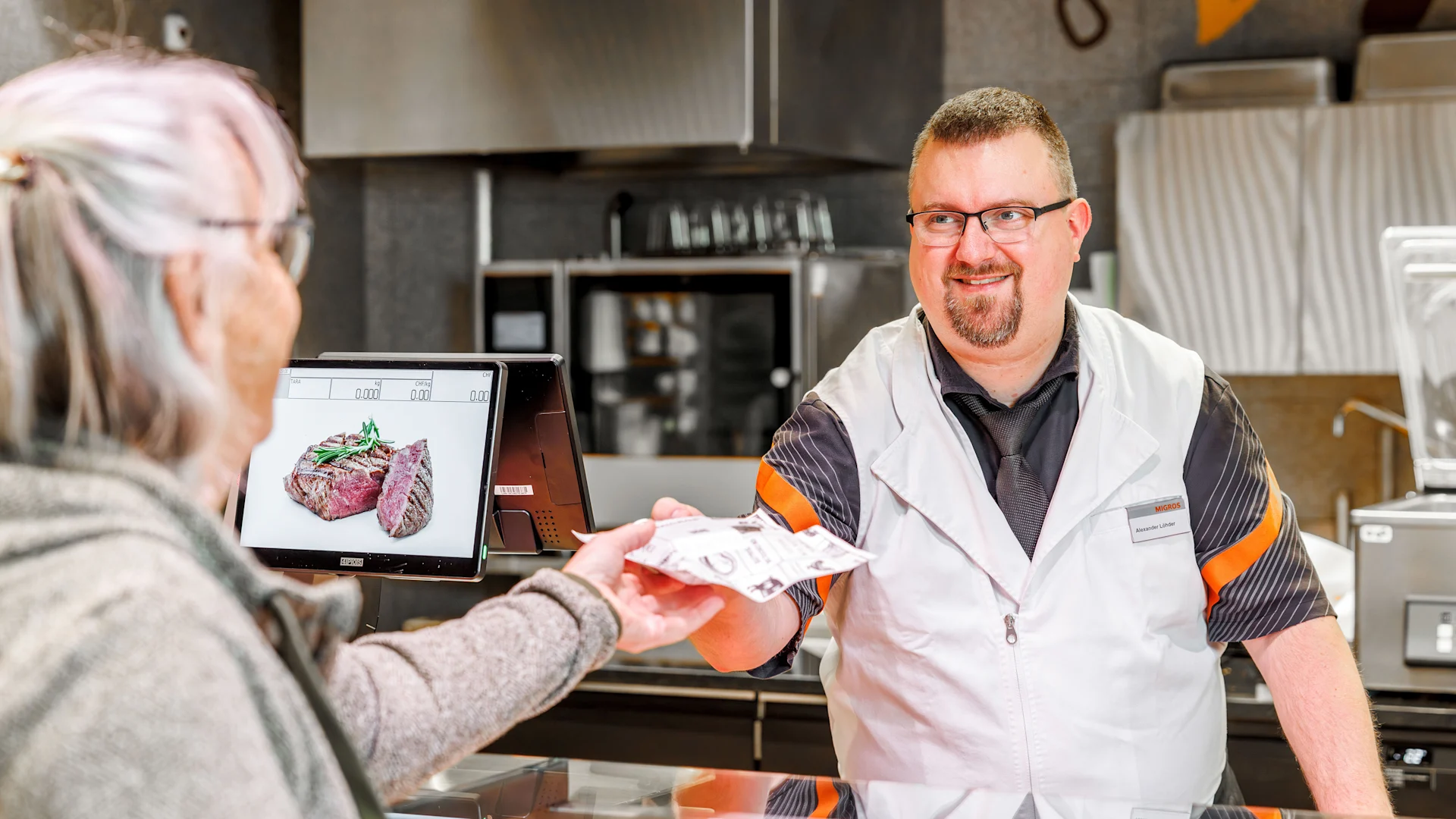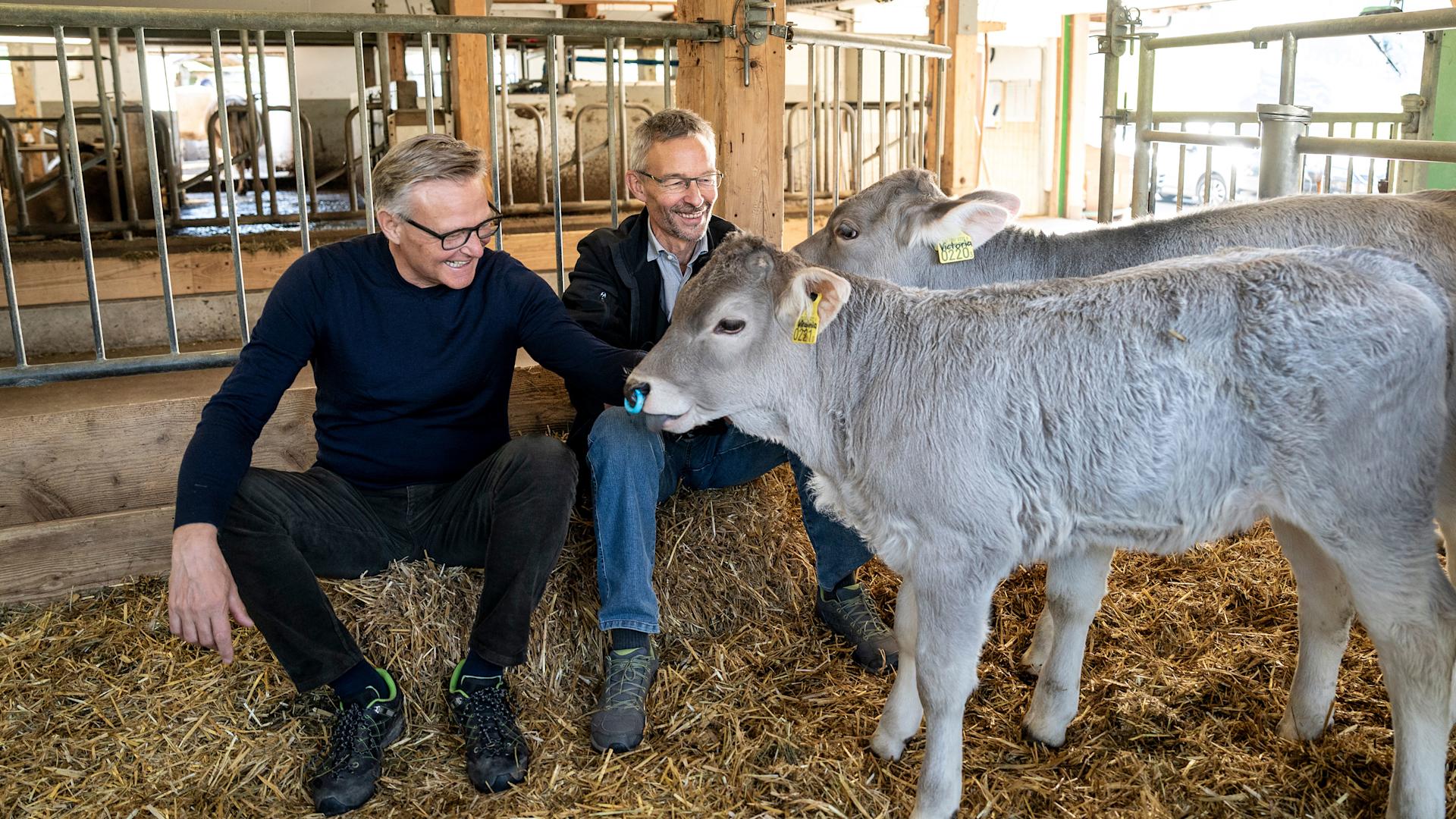
Supermarket
A look behind the meat counter
What customers want in the run-up to the festive season and the mistakes many people make when preparing meat.
navigation

Interview
How extensive will Migros’ range of organic products be in future? And what pricing will apply? We discussed these issues with Bio Suisse President Urs Brändli and Migros CEO Mario Irminger.
Mario Irminger, Migros is making headlines at the moment because of its low prices and own brands. Just how important are organic products at Migros?
Irminger: They’re extremely important. Migros has stocked a range of high-quality organic products for many years, including in the low-price segment. We introduced the Bio Suisse “Bud” in 2022, but had actually already met the standards prior to that. The label highlights our commitment to Swiss produce and its processing in accordance with Bio Suisse guidelines.
Urs Brändli, so what does the President of Bio Suisse notice when shopping at Migros?
Brändli: I hear many people saying organic products are not as good as they used to be. I believe that Migros must be careful to not lose loyal organic customers.
Does Migros sell fewer organic products today than in the past?
Irminger: No, quite the opposite in fact! Our organic range has increased by 7.5% over the past five years. Our range includes around 4,000 items, varying slightly depending on the season and store. The “Bud” label is currently featured on around 600 products.
Do you plan to extend the organic range?
Irminger: Migros is continuing to focus on organic products. We nevertheless believe our current range is well aligned with the needs of our customers. In future, we aim to provide the range with a clearer structure.
Brändli: I would certainly support that idea, because providing a streamlined and clear structure for organic products makes it easier to see and find them.
Farmers do not bear the cost burden of lower pricing.
20 Migros organic products are currently part of our low-price product range too. Can such low pricing really be applied to organic products?
Irminger: Yes, it is feasible. Migros’ low-price products are of the same quality but just as attractively priced as those of its competitors. Our aim is to make organic food affordable for people, regardless of their budget.
And at whose expense is that? The farmers?
Irminger: No, the agricultural sector and producers do not bear the cost burden of lower pricing. The price cuts are covered through internal efficiency gains and better price negotiations with international brand suppliers.
How is the low-price strategy going down with organic farmers?
Brändli: It wasn’t very well received initially, but we trust Migros to honour its pledge and not to pass on price pressure to farming families. Generally speaking though, I find it difficult to accept food getting cheaper and cheaper. This trend is resulting in a loss of value and means a lack of recognition for all the hard work that goes into producing it. It more often leads to more food waste too. That isn’t sustainable.
The share of organic meat products at Migros is still quite low. Does that indicate a lack of demand or is production lagging behind?
Irminger: The beef trend is stable and positive, poultry has enormous potential, whereas pork is showing signs of stagnating. It is vitally important that the planning of the quantities required is closely coordinated with the farmers.
Brändli: Consumers who buy organic meat tend to consume less meat. Joint beef projects have already been launched with Migros and Micarna. However, there’s still a great deal of potential that we aim to tap into together.
The most important point isn't always where something comes from, but how it was produced.
The demand for poultry products sometimes outstrips supply. Do you plan to sell more organic chicken
Irminger: Yes, there is growing demand for poultry. Approximately 85% of our poultry already comes from Switzerland. We’re currently looking into how we can make chicken production even more sustainable. This means longer rearing periods, less intensive breeds and greater freedom of movement for livestock. The aim is to ensure chicken remains available for customers, farmers are paid fairly and production is put on a sustainable footing.
Brändli: From our perspective, it is vital that farmers can plan for the long term. Organic chicken costs more because the animals live twice as long and are bred less intensively. If demand rises, Migros can send out the signal – we need more organic chicken. Organic chicken is always produced under contract for the retail sector – and not to the detriment of organic farms I hasten to add.
Migros’ Alnatura brand is an organic range produced entirely abroad that’s much cheaper than Bio Suisse. What’s the strategy behind that?
Irminger: For fresh products, such as vegetables, eggs, milk and bread, we clearly favour Bio Suisse. Alnatura offers impressive processed products – the two labels complement each other.
Mr Brändli, as a consumer, is it better to buy organic vegetables from abroad or conventionally grown ones from your local region?
Brändli: Organic vegetables from the local region are definitely the best option. If they aren’t available, it probably means they are out of season and then the most sustainable option would be to go without them altogether. But most people don’t want to do that, and in a country where 50% of food is imported, you can’t do without imported goods – not even in the organic sector. The most important point isn’t always where something comes from, but how it was produced. My advice is to always use your common sense.
Irminger: Consumers really value our “From the region. For the region.” label – short distances and proximity really matter. Quite a few fresh products are both produced in the local region and organic.
Which organic products do you buy most often yourself?
Irminger: Organic milk and eggs – and I’m far from the only one. Milk and eggs have been amongst the best-selling organic products at Migros for years.
And what about your favourite product, Mr Brändli?
Brändli: Definitely the organic cherry yoghurt.
Discover exciting stories about all aspects of Migros, our commitment and the people behind it. We also provide practical advice for everyday life.